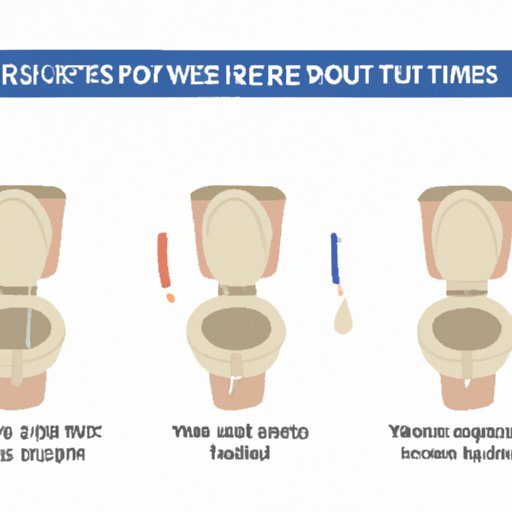
I. Introduction
A urinary tract infection (UTI) is a common health problem affecting millions of people each year. UTIs can cause painful symptoms and, if left untreated, may lead to more severe health complications. In this article, we will explore the seven common causes of UTIs, the importance of good hygiene habits in preventing them, how sexual activity can increase the risk of UTIs, the negative effects of holding in urine, how diet can affect UTIs, unique causes and risk factors for men, and ways to identify and treat recurrent UTIs.
II. 7 Common Causes of Urinary Tract Infections
UTIs occur when bacteria enter the urinary tract, causing an infection. While anyone can develop a UTI, there are seven common causes that increase the risk:
- Bacteria from the bowel: E. coli bacteria from the bowel are a common cause of UTIs. These bacteria can travel to the urinary tract when proper hygiene is not maintained.
- Poor wiping habits: Wiping from back to front after using the toilet can transfer bacteria from the anus to the urinary tract, leading to an infection.
- Using irritating products: Bubble baths, powders, and other irritating products can cause inflammation in the genital area, increasing the risk of UTI development.
- Dehydration: When not enough water is consumed, urine becomes more concentrated, leading to a higher concentration of bacteria in the urinary tract.
- Chronic illnesses: Illnesses such as diabetes, cancer, and kidney stones can decrease the immune system’s ability to fight off infections, making a UTI more likely.
- Urinary catheters: Catheters can act as a gateway for bacteria to enter the urinary tract, which can lead to a UTI.
- Pregnancy: Hormonal changes during pregnancy can cause changes in the urinary tract, increasing the likelihood of a UTI developing.

III. How Poor Hygiene Habits Can Lead to UTIs
Maintaining good hygiene habits is essential in preventing UTIs. The following tips can help reduce the risk of developing a UTI:
- Wiping front to back: Wiping from front to back after using the toilet helps prevent transferring bacteria from the anus to the urinary tract.
- Showering instead of taking baths: Bathwater can be a breeding ground for bacteria, so taking a shower instead reduces the risk of infection.
- Wearing cotton underwear: Cotton underwear allows the genitals to breathe and helps prevent the buildup of moisture that can increase the risk of infection.
IV. Exploring the Link between Sexual Activity and UTIs
Sexual activity can increase the risk of developing a UTI:
- Urinating before and after sex: Urinating before and after sex helps to flush out bacteria that may have entered the urinary tract during intercourse.
- Using lubrication: Lubrication can prevent irritation to the genital area, reducing the risk of infection.
- Avoiding certain types of birth control: Certain types of birth control, such as spermicidal foam and diaphragms, can increase the risk of UTIs. Consider discussing alternative options with a healthcare provider.
V. Why Holding in Your Urine is Bad for Your Health
Holding urine in the bladder for long periods can increase the risk of UTIs due to allowing bacteria to multiply. The following tips can help maintain healthy urinary habits:
- Urinating regularly: Regular urination helps to flush out bacteria in the urinary tract.
- Avoiding caffeine and alcohol: Caffeine and alcohol are known irritants to the bladder and can increase the risk of infection.
- Strengthening pelvic floor muscles: Pelvic floor muscle exercises can help reduce urinary incontinence, which can lead to holding in urine and increased risk of infection.
VI. The Role of Diet in Preventing Urinary Tract Infections
What you eat and drink can affect the likelihood of developing a UTI:
- Drinking plenty of water: Drinking enough water helps to keep urine diluted, which reduces the concentration of bacteria in the urinary tract.
- Consuming cranberry juice or supplements: Cranberry contains a compound that helps prevent bacteria from adhering to the walls of the urinary tract.
- Eating foods rich in probiotics: Probiotics promote a healthy balance of bacteria in the gut, which can reduce the risk of UTIs.
VII. Understanding UTIs in Men: Causes and Risk Factors
While women are more likely to develop UTIs than men, men can also be affected. The following tips can help reduce the risk of UTIs in men:
- Maintaining good hygiene habits: Proper hygiene habits, such as wiping from front to back, can help reduce the risk of infection.
- Drinking plenty of water: Drinking enough water helps to keep urine diluted, which reduces the concentration of bacteria in the urinary tract.
- Avoiding certain irritants: Certain products, such as bubble baths, can irritate the genital area and increase the risk of UTIs.
VIII. How to Identify and Treat Recurrent UTIs
Recurrent UTIs are defined as two or more infections within a six-month period. The following treatment options are available:
- Antibiotics: A healthcare provider may prescribe antibiotics to treat an active infection. If recurrent infections occur, prophylactic antibiotics, taken over an extended period, may be recommended.
- Prophylactic antibiotics: This approach involves taking a low dose of antibiotics over a prolonged period to prevent recurrent infections.
- Natural remedies: Some natural remedies, such as drinking cranberry juice or taking probiotics, may help prevent the recurrence of UTIs, although further research is needed to confirm their effectiveness.
IX. Conclusion
UTIs can cause discomfort and, if left untreated, can lead to more severe health complications. Maintaining good hygiene habits, eating a healthy diet, and staying hydrated are crucial in reducing the risk of developing a UTI. If you experience frequent UTIs, seek medical evaluation and treatment as necessary.





